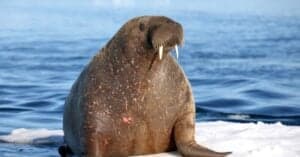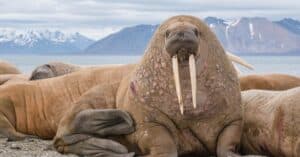The British Antarctic Society and World Wildlife Foundation (WWF) are looking for “citizen scientists” to help look for walruses in their Walrus From Space project. Due to the increasing temperatures in the Arctic and our current climate crisis, walruses are now a threatened animal population.
However, you can help! The Walrus From Space project tracks walrus populations with the help of satellite images and citizen scientists. All you have to do is complete a walrus-searching tutorial and then begin looking for walruses. The Walrus From Space project provides satellite images spanning across the Arctic and Laptev Sea. You just need to scan the images for walrus herds that may be lounging on sea ice shelves throughout the regions.
Walrus live in largely remote areas which is why the Walrus From Space project needs your help. With the majority of the Arctic being wildly inaccessible, the job is too big for a group of scientists. Satellite imagery and citizen scientists will allow researchers to look and take a census of the walruses across this huge tract of coastline.
How is the Climate Crisis Affecting Walruses?
Walruses live primarily on pieces of sea ice — with the habitat warming up, these pieces are melting, forcing walruses to move to mainland parts of the Arctic. Right now, the Arctic is warming up three times faster than the rest of the globe. The rapid warming is not only melting the sea ice, but forcing walrus herds further away from their food sources. This causes walruses to expend more energy looking for food and rapidly reduces the areas they can search as they no longer will have sea ice to rest upon.
In addition, the climate crisis is affecting the walruses’ food supplies. Walruses primarily eat sea snails, crabs, and mollusks. The Arctic Ocean is becoming more acidic as it absorbs more carbon dioxide produced by global warming. This acidity makes it more difficult for these creatures to build their shells and survive in the Arctic. Ultimately, if these smaller creatures can’t survive in the Arctic, walruses won’t be able to either.
As the sea ice melts, shipping paths will begin to open up in the Arctic regions, further displacing walruses and cutting off their food supply. Understanding the size of the walrus population and beginning to track their movements is crucial to conservation efforts. Walrus From Space will hopefully be able to build conservation projects to protect walrus herds from additional shipping routes.
How Walrus From Space Will Help
By using citizen scientists to help track walrus populations, Walrus From Space hopes to be able to track the movements of walrus populations as their environment changes. The images citizen scientists search through span thousands of miles of the Arctic coastlines.
Walruses live in the water regions around Russia, Greenland, Norway, and Canada. Also with the help of indigenous knowledge and tracking systems, Walrus From Space will be able to study walrus movements and lifestyle. This type of research is impossible to conduct using traditional research methods, so Walrus From Space’s innovative use of public wildlife enthusiasts is introducing a new way to track walruses.
Satellite images do not disturb walruses, meaning this study is being done on a large scale, covering vast regions, but will not interfere with the walruses’ already endangered habitat. All of the data collected by Walrus From Space’s project will directly help and impact conservation efforts motivated to help the walruses and protect the Arctic.
How Can I Help?
You can help by joining the Walrus From Space project. All you need is access to the internet and some free time.
You can sign up for a walrus-spotting account through Walrus From Space. They will have you complete a short video tutorial to ensure that you know how to spot walruses. Then, once you have passed the tutorial, Walrus From Space will provide satellite images for you to scour for walrus herds.
The Walrus From Space project even has achievements, goals, and badges to unlock as you work through the satellite imagery!
If you choose to participate, have fun searching for walruses! And thank you for creating a better future for these Arctic treasures.
The photo featured at the top of this post is © Ansgar Walk / CC BY-SA 3.0 – License / Original
Sources
- , Available here: https://www.wwf.org.uk/learn/walrus-from-space?utm_source=news_pr&utm_medium=mediacoverage&utm_campaign=uk_wfs2022&utm_content=uk_walrusfromspacev1&pc=AVL007001#what-else-you-can-do
- , Available here: https://www.theguardian.com/world/2021/oct/14/walrus-from-space-census-seeks-public-help-to-spot-animals-in-satellite-images
- , Available here: https://www.bas.ac.uk/
Thank you for reading! Have some feedback for us? Contact the AZ Animals editorial team.





